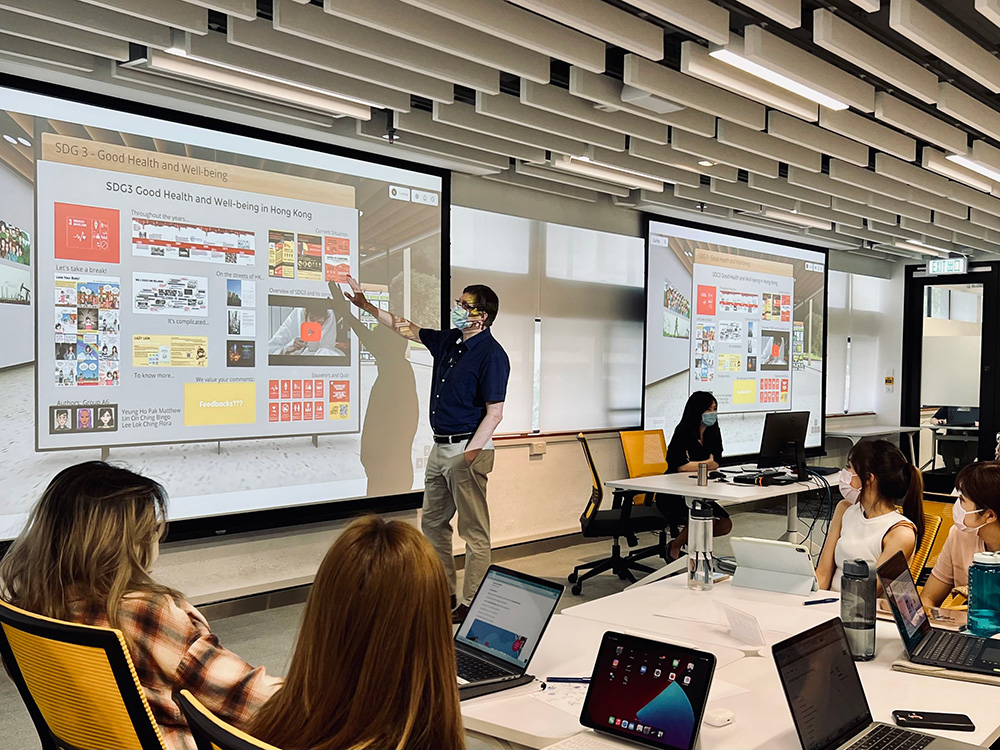May 2023 | Volume 24 No. 2
Virtual Visibility
Now supporting more than 2,000 users within and outside the University of Hong Kong, Curios is a virtual teaching and learning tool that is open for teachers and students to use in facilitating their courses.
The platform grew out of a decision by Mr Mathew Pryor, Associate Professor (Teaching) in the Faculty of Architecture and the principal investigator of Curios Metaverse project, to rework a long-running Common Core course as a flipped class, replacing the lectures with a learning journey of pre-class online exercises, tutorials and in-class workshops.
“It was 2018, so pre-COVID, and I had become interested in how students operated in online environments,” he said, “in particular how they interacted outside the classroom when they were no longer in the same physical location and working at different times.”
The advent of COVID gave impetus to the project and in 2020, Mr Pryor and Ms Lynn Hanyuning Lin, Digital Learning Designer in the Division of Landscape Architecture, joined forces to develop the idea of creating a digital exhibition space (now called Curios), a virtual 3D gallery which students could use to present and share their projects and undertake peer review and give peer feedback. A key feature of Curios was that it would provide students with oversight of their classmates’ work and make learning outcomes visible.
“We wanted to break the boundaries of the classroom and provide teachers and learners with a multifunctional, affordable virtual workspace where learning would be social, manageable and sharable, and where the learning process and outcomes would be visible,” said Mr Pryor.
Throughout development, the team sought input from teachers and learners on what the pain points of working from home were. These included poor communication in online and hybrid environments – particularly a lack of social and technical dialogue – which could lead to misunderstandings that were only exacerbated by the use of Zoom. Lack of peer support, little opportunity to compare their own work with what others were doing, limited reflection on learning, and no regular working environment were also frequently cited as problematic.
“Usually students see the campus as ‘the space to study and work’ and can lack learning motivation when outside this space,” said Mr Pryor. “Working online often generates a sense of isolation. Some students are able to find a way to cope but less confident students struggle and often just stop. A sense of a ‘learning community’ is essential and something teachers need to facilitate amongst students.”
In answer, Curios has fostered socialised forms of online learning, creating a virtual space and a pedagogical approach that require students to interact and collaborate even though they may be working at different times and in different places.

Curios has supported over 2,000 users within and outside the University of Hong Kong over the past two years, including some local schools and NGOs.
Guided interactions
“Both contextual relationship-oriented and designed task-related interactions are carefully facilitated and guided by the instructor and tutors,” said Ms Lin. “Students work on Curios, both in the classroom and outside (in the study room, dorm, home) and can use the chat function to collaborate and give feedback. Clear course planning and technical support are provided so that students will not feel lost.”
The virtual space also visualises learning progress and learning outcomes, allowing students oversight of each other’s work, and enabling them to give and receive feedback. Importantly too, Curios has a series of embedded game elements (for example, rewards and events that happen when they reach a milestone) that encourage students to interact and explore, and promotes progressive learning.
“We aim to make Curios sustainable in different educational contexts, technically and financially affordable for instructors and learners, and hope that it will promote innovative pedagogical design across disciplines,” said Mr Pryor. “Curios has been particularly effective in facilitating socialised learning in the large-sized classes (120 students) of HKU’s Common Core curriculum, with students working in mixed groups from different faculties. Users outside HKU, including schools and NGOs, also enjoy using Curios for different events. Our long-term vision is to make the platform available to as wide an audience as possible, particularly amongst low-income sectors and schools with limited resources in Hong Kong and the wider region.”
In 2023, the Curios team is hoping to collaborate further and help more teachers and students enrich their virtual learning experiences. “Although the ‘metaverse’ concept is still emerging, and to date investment in the idea has been largely focussed within the computer gaming and finance industries, we are excited by the possibilities of creating an ‘educational metaverse’ and we are exploring how platforms such as Curios might be developed to link students and instructors together within a socialised virtual learning environment,” said Mr Pryor.
We wanted to break the boundaries of the classroom and provide teachers and learners with a multifunctional, affordable virtual workspace where learning would be social, manageable and sharable, and where the learning process and outcomes would be visible.

MR MATHEW PRYOR

